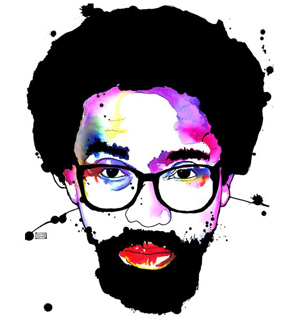
I had heard of the name Cornel West in passing many times but it wasn’t until his guest appearances on the HBO show Real Time that I began to get to know him. I went out of my way to watch the episodes where he would appear and would be astounded by nearly everything that he spoke of. He has a very profound way of expressing new and thought provoking ideas on nearly every subject. This was the Cornel that I had gotten to know and enjoy. This was the Cornel that he put on for that particular audience. At Bennett College, on the other hand, I got the chance to see a much more relaxed version.
Bennett College is listed as one of the 103 remaining historically black college and universities (HBCUs) left in the US. They were founded before 1964 and serve the black community. In addition, Bennett College only admits women. So Cornel was in prime location for some inspirational words of wisdom. While I knew that much of it wouldn’t be too inspirational to me (I’m not a black woman) it would still live up to the Real Time Cornel that I got to know. It turned out to be inspirational in different ways for me.
Cornel West currently teaches at Princeton University under the African American Studies department, with courses directly in religion or based on religion being his primary offerings. The lecture he gave in many ways was a sermon, although there were too many times that what he was talking about was very inappropriate for church – masturbating, orgasms, sex, drugs, etc.
He did a very good job of bringing out the black perspective. Not to insinuate that he fabricated problems which affect the black community out of otherwise cross-racial and cross-economic issues, but he was able to always discover, point out and focus on issues and how they affect the black community as a whole. The inspirational aspect of the lecture came about in his advice for overcoming and moving past such issues by mainly “looking in the mirror to discover your true self and in doing so will you only then be able to realize others’ faults and look past them.” However, I did notice a few glaring mistakes in Cornel’s observations which led me to believe there were other inconsistencies with his findings.
In his talk about Obama, he likened Obama to someone who is a descendant of the slave times, grew up knowing many hardships and being part of the blues. As Obama has shattered the glass ceiling by making into the White House he has to remember about those still in the basement; while it’s a grand accomplishment, he mustn’t forget about his brothers. While he made it into the White House, it’s still just a house built by slaves. While we have records that the White House built in 1800 was done so by slaves, what about the rebuilding after the War of 1812? Further, while it’s a historic event that we are able to elect a bi-racial African-American, he is not a descendant of slaves. His mother wasn’t a descendant of slave owners and his father was from Kenya.
Cornel also insisted that when Obama won the vote in Iowa, “the people of Iowa were a little less racist that day than they were the day before.” Now, I’m no expert on Iowa by any means but isn’t it a bit of a farce to insist that everyone in Iowa is racist against black people but, considering who their choices were, they voted for Obama? Perhaps the entire state is racist. Perhaps, given a choice between someone they hate based entirely on the pigment of their skin and an old guy with a woman VP, they voted for the thing they hated the least. Perhaps Cornel sees a lot of people as possibly or potentially racist.
Many of the topics made me feel uncomfortable as they devolved into racism. Perhaps as a person who has been privileged enough to lead most of my life without racism as a forefront thought, I am unable to so easily find the racism effect in so many prevalent issues in society, so it was jarring to hear of it. Too many times it felt almost as if everyone in the chapel was about to collectively give me a dirty look in my direction. To be fair, I was in the minority as I’m a white and a male and an immigrant.
The entire lecture was very interesting in so many ways and it was awesome that I had the opportunity to see Cornel West in person. If the stage hadn’t been descended upon by half of the audience, I would’ve liked to have chatted to him for a minute.
I really liked the man before getting the chance to see him in person. Now I respect him.